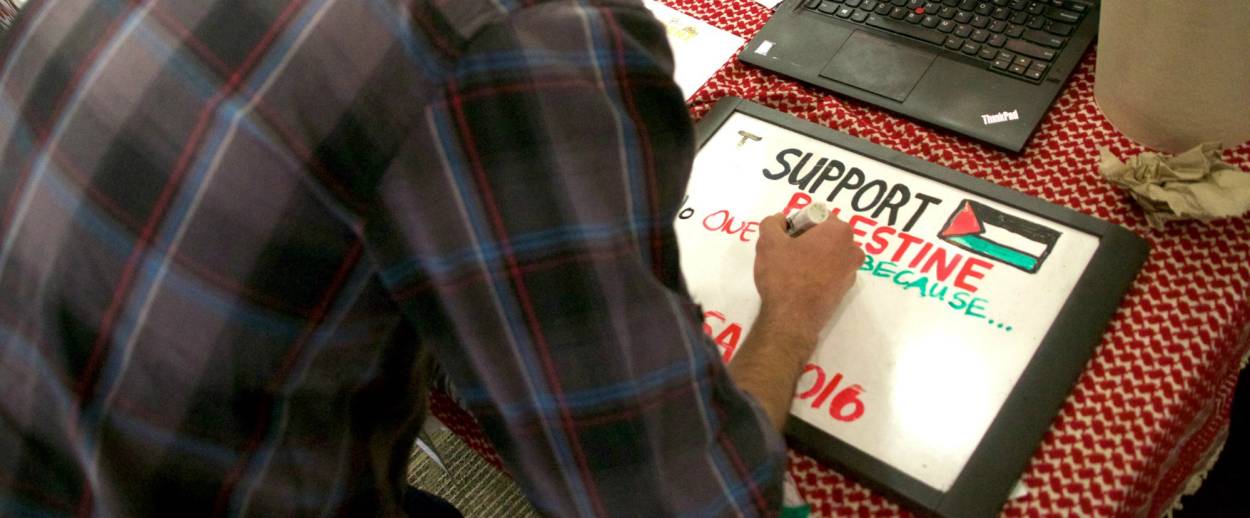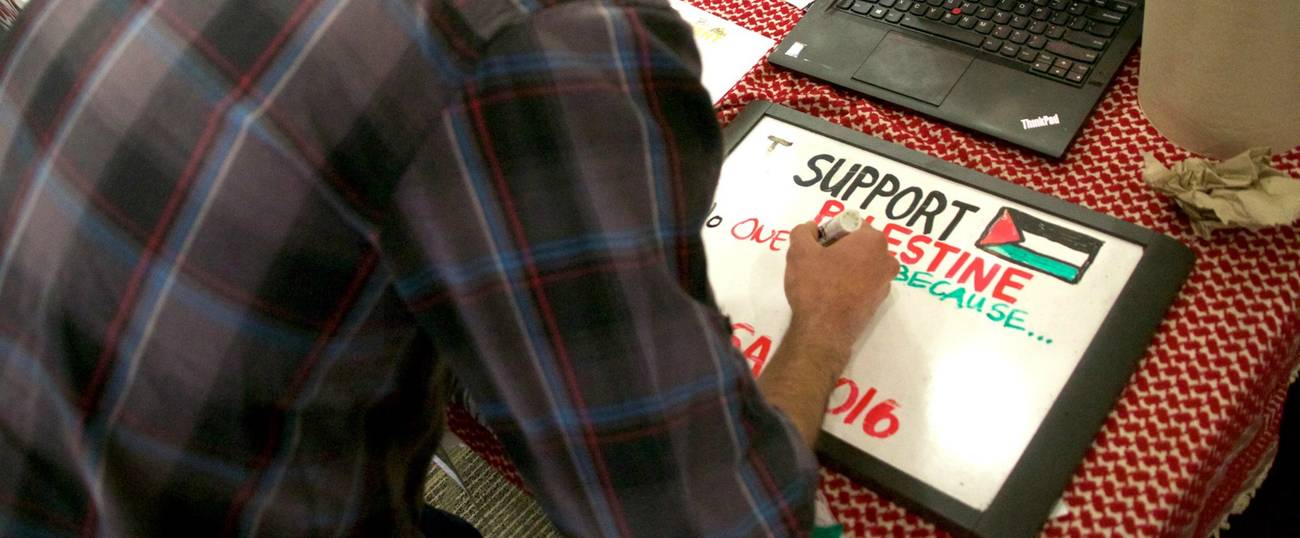Over the weekend, National Students for Justice in Palestine (NSJP), which coordinates more than 160 chapters of Students for Justice in Palestine (SJP), held its sixth annual conference just outside the nation’s capital at George Mason University (GMU), Virginia’s largest public research university. The conference was hosted by George Mason University Students Against Israeli Apartheid and held on-campus on the third floor of the student Johnson Center. It was attended by more than 200 activists from the U.S. and abroad. Its theme was “Critical Mass: With Our Roots in Resistance, Forging a Just Future.” The Anti-Defamation League, far from a “right-wing” institution, has labeled SJP “the primary organizer of anti-Israel events on U.S. college campuses and the group most responsible for bringing divestment resolutions to votes in front of student governments.” I was keen to check out the conference and learn more about its aims and the motivations of its attendees.
On a beautiful, cloudless, and unusually warm November morning, I went to the registration desk and asked SJP communications personnel for comment, but I was told that both organizers and attendees would only speak with “registered media.” I explained to a recent graduate from Tufts University, who was in charge of NSJP’s media email account, that I was a freelance journalist. I gave her my business card and pulled up my website on my iPhone to provide her with a sense of my writings. She was genuinely sympathetic, interested, and instructed that I apply for a credential through NSJP’s website. I did, but my application would soon be denied. The Tufts alumna had indeed explained upfront that approval was unlikely because my request was “the day of” and her organization was worried about infiltration and negative press. She specified that a “right-wing publication,” which had tried to link SJP with Hamas, also sought a credential.
I respect that NSJP was holding a private event. As such, I further appreciate that it was wary to have journalists floating around its reserved area and observing its workshops. That being said, there were two things I found troubling with the experience up-front.
First, NSJP had not just meticulously cultivated media access, but it had apparently also done so on an overtly ad hoc basis. Through conversation a few paces outside the conference area, I learned that a reporter from The Weekly Standard, a conservative magazine, applied for a credential two weeks prior to the event yet was turned down. A reporter with Ha’aretz was approved—but he was not permitted to enter the conference. Conversely, a freelance reporter with Mondoweiss, a progressive and anti-Zionist website, received a credential 11 days prior without even asking for it: NSJP had actually taken the initiative of mailing it. Also, a reporter and a cameraperson with Al Jazeera showed up without advance notice and were swiftly given credentials, which consisted of lanyards affixed with handwritten notecards.
Second, and more disturbingly, NSJP organizers seemingly inculcated a sense of paranoia among its attendees, ostensibly with the aim of maintaining silence and order. Just sitting in a chair on the third floor of the Johnson Center, I heard one NSJP organizer warn a group of attendees there were “hard-core conservatives lurking around.” Another, while expressing concern to a colleague about his profile on the Canary Mission database, worried aloud about the number of pro-Israel “spies” now on American campuses. (Canary Mission, according to its website, “was created to document the people and groups that are promoting hatred of the USA, Israel and Jews on college campuses in North America.”)
At the beginning of the day, the Tufts alumna kindly entreated that I not approach attendees for comment. Why? Because attendees had been assured that the conference was private and there wouldn’t be much press present. I immediately pointed out that I was free to approach attendees—they were, after all, readily identifiable due to their nametags emblazoned with the image of Palestine—beyond the conference’s designated space on the third floor. She was visibly unsettled, but acknowledged, hesitantly, that I was correct.
My efforts, nonetheless, were futile.
I requested comment from 20 attendees and, unfortunately, all of them declined. I even offered to keep everything “on background.” Some, it was clear, were eager to share their thoughts. But after every time I went up an attendee, an NSJP organizer—whom I can only describe as a “spotter”—would sprint from her lookout post at the conference’s entrance and warn that I was, again, “outside media.” Moreover, NSJP wouldn’t even allow me to look at the literature on the registration desk it had produced for the conference. I informed NSJP several times that I merely wanted to provide the public with the most accurate picture of their organization and event as possible. “We’re sorry, we can’t help you,” I was told, over and over.
Nevertheless, I easily discerned a markedly critical attitude toward the U.S. as well as Israel. Within earshot, attendees milling about passionately disparaged “systemic racism,” bigotry, and income inequality in America. Later in the day, one attendee, a graduate student at the University of Illinois at Chicago and self-proclaimed “comunista,” tweeted a selfie with the caption, “That awkward moment when you’re at #NSJP2016 but you walk through a Pence rally #AmericaWasNeverGreat.” (Republican vice-presidential candidate Mike Pence held a rally at GMU on Saturday evening.) On Sunday, another attendee, also using the #NSJP2016 hashtag, tweeted a photo with shoes piled atop an Israeli flag on the floor with the caption, “Best doormat ever.” It was since been deleted. Perhaps most alarmingly, a number of outwardly violent messages were fired out across social media. One attendee, for example, after discovering that pro-Israel activists were also on site, tweeted, “I’ll fuck up a Zionist.”
A “counter event” of nearly 50 pro-Israel students, activists, and local residents also took place on Saturday in the Johnson Center. It consisted of a panel discussion on the ground floor, hosted by Christians United for Israel, and, afterward, a separate demonstration on the third floor, organized by Turning Point USA, a nationwide campus non-profit “promoting limited government and capitalism.” The panel featured Noah Pollak, Executive Director at the Emergency Committee for Israel, Izzy Ezagui, a former squad commander in the Israel Defense Forces, and Jonathan Schanzer, Vice President of Research at the Foundation for Defense of Democracies, who has testified before Congress about SJP’s financial and institutional backing.
Mid-afternoon, pro-Israel advocates gathered for the Turning Point USA-organized demonstration at the entrance of the NSJP’s conference. For about 20 minutes, they chanted Zionist slogans, mocked the “illiberalism” of SJP’s brand of “social justice,” and sang “Hatikvah.” They also carried signs that read, “Jewish Lives Matter—Say NO to HATE,” “Know the Truth: BDS = HATE MOVEMENT,” “Say NO to Anti-Semitism,” “HATE GROUP: SJP – HATE MOVEMENT: BDS,” “Why Won’t SJP Boycott Syria, Russia, and Iran?” and “SJP Calls Murder of Civilians ‘Resistance.’” SJP activists reacted by locking arms, facing away, and repeatedly directing each other to “not engage.”
Noticeably absent from the counter event were establishment Jewish groups, such as Hillel, Israel on Campus Coalition, AIPAC on Campus, and StandWithUs. For the most part, the people willing to challenge BDS and defend the Jewish state were Christians, conservatives, and free-speech advocates. Lending credibility to a growing sense that the Jewish-American community’s preeminent organizations are allergic to confrontation were the preemptive actions taken by the Hillel at George Mason University Hillel. It launched a website, “Embrace Diversity,” and held a series of alternative events that promised to “provide safe engaging spaces for Jewish and pro-Israel students.” For instance, last Tuesday, it held a program called “Tikkum Olam Around the World”; on Friday, an interfaith Shabbat dinner; and, on Saturday, an off-campus Havdalah and bonfire. These events took place despite the fact that “SJP seeks to vilify Israel and creates a hostile environment that can lead to anti-Semitism,” as Rabbi Joshua Ackerman, Executive Director of George Mason University’s Hillel, acknowledged in a mass email.
Meanwhile, the counter event participants considered their approach—which they initially deemed “an experiment”—a tremendous success. The panel and demonstration represented a break with the Jewish-American community’s prototypical responses to the BDS movement: addressing accusations—and, thus, lending them an air of legitimacy— and holding “pro-Israel” events. The panel, specifically, was designed to be singularly “anti-BDS.”
“Our aim,” stated Jessica Marzucco, director of CUFI on Campus, “was to bring the truth about Israel and the BDS movement to a campus that has been inundated with false, anti-Israel messages—and this panel achieved just that. There are challenges along the way, but the truth is on our side. As long as we stand up and speak out, we will win the debate.”
“We wanted to put out a message about SJP,” stated Pollak, a panelist. “We wanted to show people in the media what BDS really is. It’s a hate group and a hate movement. The social justice rhetoric they spout is a lie. They’re really supporters of terrorism. They have no positive agenda. They only desire to wipe out Israel.”
As for the demonstration, it was judged a victory for free speech. “When no one else wanted to go up against SJP and their reputation to intimidate and silence opinions not their own,” said Jordan Miller, Virginia Field Director at Turning Point USA, “our organization was happy to empower, organize, and mobilize a large group of people to show SJP that they don’t get to control the Israeli-Palestinian narrative.” Ron Feingold, Director of Israel Engagement and Outreach at Turning Point USA, affirmed: “Those that attended SJP’s national conference now know that if they choose to continue to try to silence Jewish and pro-Israel communities they will have organized and empowered activists standing up to their hate.”
Pollak appended that the demonstration had the additional benefit of turning the tables on SJP. “They’ve been doing this to us for years now,” he said. “They’ve been putting us in a lose-lose situation because their message was the only one getting out. But when they were taking pictures and video of our protesters on Saturday, the world was seeing our message: SJP is a pro-terrorist organization. That’s a win for us.”

